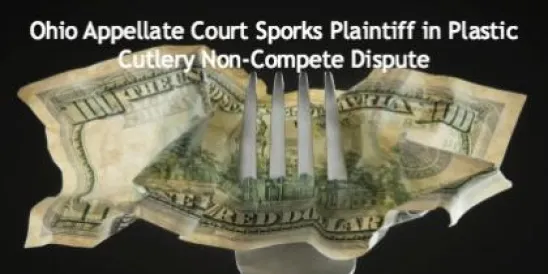An Ohio appeals court recently held that an employee did not breach his non-competition agreement by creating his own business in the same industry as his former employer, despite the fact that the former employee contacted clients of his former employer and began compiling an inventory during his restricted period. Berk Enterprises, Inc. v. Polivka, 11th Dist. No. 2012-T-0073, 2013-Ohio-4961. While the court of appeals held that the non-competition agreement was enforceable against the former employee, it determined that the specific language of the non-competition agreement did not prohibit the former employee from taking steps during the restricted period of the non-competition agreement to create a business that would compete in the same industry following the conclusion of the restricted period.
Facts
In 2007, Robert Polivka was hired as a salesperson for Berkley Square, a division of Berk Enterprises, Inc., an Ohio corporation that imports plastic cutlery for re-distribution throughout the United States. In that role, Polivka had access to a variety of confidential information, including sensitive pricing and customer information. As a result, Berk required that Polivka sign a non-competition agreement which stated that, for one year following the conclusion of Polivka’s employment with Berk, Polivka could not:
(i) engage in or carry on, directly or indirectly, any activity or business as an employee, independent contractor or agent, partner or otherwise, which provides, designs, develops, markets, invests in, imports, produces or sells any products, services, or businesses, which are the same or similar to, or competitive with those designed, developed, produced, marketed, invested in, provided or sold by BERK and its Affiliates (a ‘Competing Business’); (ii) have a direct or indirect interest in, or be Affiliated with, or render any services for, any person or entity engaged or carrying on, directly or indirectly, any Competing Business in the Territory; (iii) induce or attempt to induce any client, customer or supplier of BERK to reduce the business done by such supplier, customer or client with BERK and/or its Affiliates; (iv) divert or attempt to divert any of the BERK’S’s and/or any of its Affiliates’ business to Employee or to any party on whose behalf Employee is acting, either directly or indirectly, or solicit any of BERK’S and/or any of its Affiliates’ customers/suppliers with whom Employee dealt on behalf of BERK and/or any of its Affiliates during the time the Employee is employed by BERK; (v) solicit or induce any Employee, distributor, sales representative, agent or contractor of BERK to terminate his, her or its employment or other relationship with BERK or any of its Affiliates; or (vi) engage in any practice, the purpose or result of which is to evade the provisions of this Agreement or to commit any act that is detrimental to the successful continuation by BERK and its Affiliates of its/their business.
While still employed by Berk, Polivka and a partner set up a business called R & G Packaging, LLC. This business was created to import and sell plastic cutlery and other disposable products similar in nature to Berkley Square’s line of products. In July 2010, approximately a month after forming R & G, Polivka resigned from his position with Berk.
Immediately following his resignation, Polivka communicated with three Berk distributors that were part of his clientele with Berk. According to Polivka, he contacted these individuals solely to inform them that he was resigning from Berk. In December 2010, while still subject to his noncompetition agreement, a broker with whom Polivka had worked while employed by Berk emailed Polivka regarding a quote on products, and inadvertently copied a current Berk employee. Once Berk learned of the email, it filed suit against Polivka alleging that he breached his noncompetition agreement. At the time Berk filed suit, R & G had not yet made any sales.
At trial, Polivka admitted that: (1) he and his partner created their new corporation before Polivka quit his job with Berk; (2) the new business would sell the same line of products as Berkley Square; (3) immediately after leaving Berk, Polivka telephoned and/or visited three Berk customers to inform them of his decision to quit; and (4) the new business was already compiling an inventory of the plastic cutlery by importing it from China. As a result, the trial court determined that Polivka violated his non-competition agreement even though R & G had not made any sales during Polivka’s restricted period, and enjoined Polivka from competing with Berk for one year following the date of the decision.
Non-Competition Agreement Did Not Prohibit Polivka’s Conduct
On review, the Eleventh District Court of Appeals stated that, because R & G had not actually made any sales during the restricted period, the issue was whether the terms of the non-competition agreement prevented Polivka from preparing to compete with Berk. Importantly, the court of appeals construed the terms of the non-competition agreement against Berk because it was a standard Berk agreement that was not the result of negotiations between Polivka and Berk.
Ultimately, the appellate court overruled the decision of the trial court and held that Polivka’s actions did not violate any of the express provisions of his non-competition agreement. The court determined that the prohibited behavior in Polivka’s non-competition agreement did not cover investing in a new entity that had not made any sales because the agreement only covered activities which would have an immediate adverse effect on Berk’s business. In reaching this conclusion, the court stated:
Taken as a whole, the evidence presented by Berk, as the plaintiff in the underlying action, did not establish that appellant had actually started to compete with the company by trying to sell plastic cutlery to the same type of customers. Rather, the company was only able to prove that he was merely preparing to compete for the same business after the one-year period had elapsed. Since mere preparation did not conflict with any express provision of the non-competition covenant, the trial court erred in finding that appellant had violated the covenant.
Conclusion
Berk suggests that Ohio employers should ensure their non-competition agreements explicitly prohibit activities ancillary to competition, including the formation of a competing business, if they want these activities to be restricted. Additionally, Berk serves as a reminder that non-competition agreements will typically be construed against employers, and that it is often difficult to prove that a former employee is actually competing in a particular industry.





 />i
/>i
